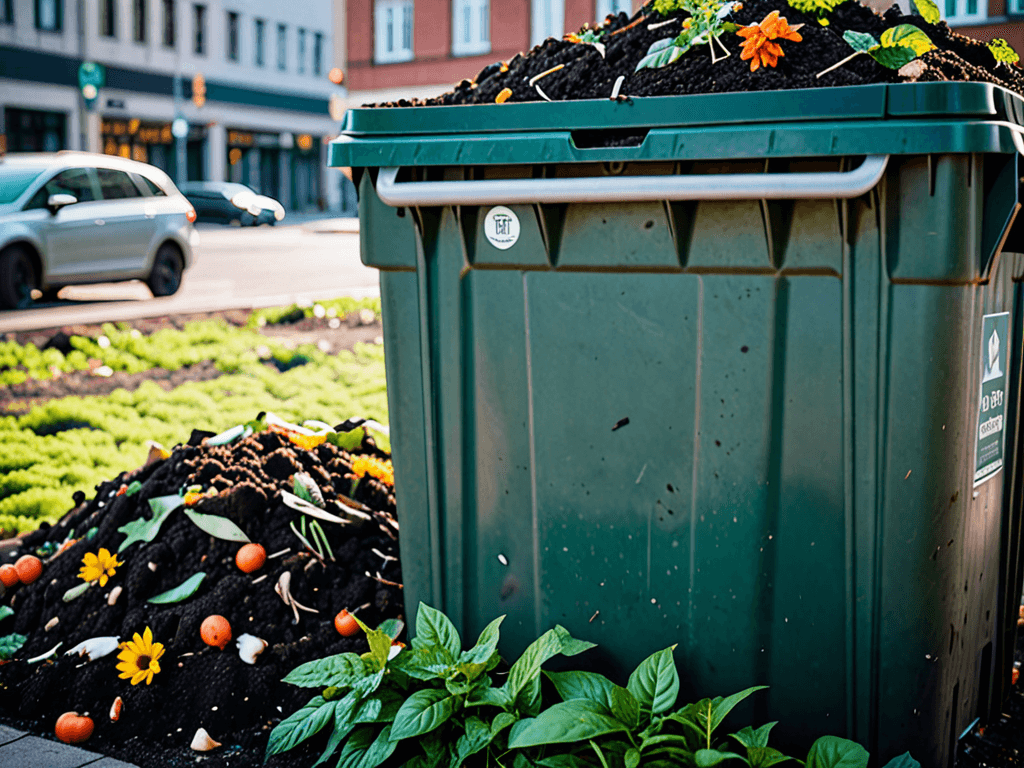Urban composting is an innovative way to manage waste sustainably in cities.
By transforming organic waste into nutrient-rich soil, urban dwellers can significantly reduce landfill contributions and revitalize urban green spaces.
Whether you’re a city dweller new to composting or looking to refine your methods, this guide will cover everything from selecting the right bin to avoiding common pitfalls.
Join the urban composting movement and contribute to a healthier planet, one kitchen scrap at a time.
What is Urban Composting?
Urban composting is a practice where organic waste, such as food scraps and yard waste, is decomposed to create nutrient-rich soil.
This process helps reduce the amount of waste sent to landfills, lowers greenhouse gas emissions, and enriches urban soil.
Composting in cities can be challenging due to space constraints, but many urbanites have adopted creative solutions such as balcony bins or communal composting sites.
These initiatives not only promote environmental sustainability but also enhance community involvement.
Urban composting transforms would-be waste into valuable resources, making cities greener and more sustainable.
Benefits of Composting in Urban Areas
Composting in urban areas offers numerous benefits, ranging from environmental to community advantages. It helps reduce landfill waste, consequently lowering methane emissions, a potent greenhouse gas.
By turning organic waste into compost, cities can build healthier, more nutrient-rich soils that support urban gardening and agriculture. Urban composting enhances biodiversity by encouraging the growth of beneficial microorganisms and insects.
Additionally, it helps conserve water by improving soil structure and retaining moisture. Community composting programs can foster collaboration among residents, creating stronger neighborhood bonds and increasing awareness about sustainability practices.
They provide educational opportunities about waste management and environmental stewardship, making it a vital component of urban life. Residents not only benefit from a cleaner city but also gain access to improved green spaces, boosting both physical and mental well-being.
How to Start Composting at Home
Starting composting at home is a simple and rewarding process. Begin by selecting the right spot, preferably in a shaded area to prevent overheating.
It’s essential to choose the right composting bin depending on available space, such as a kitchen caddy for small apartments or a larger outdoor bin for homes with a yard.
Use a mix of green materials, like fruit scraps and coffee grounds, and brown materials, such as dried leaves and cardboard, to balance nitrogen and carbon.
Regularly turn the compost to aerate and speed up decomposition. Keep an eye on moisture levels, ensuring the compost is as moist as a wrung-out sponge.
With patience and practice, you’ll produce rich, organic compost that can enhance your garden’s soil and promote healthy plant growth.
Choosing the Right Composting Bin
Choosing the right composting bin is crucial for efficient composting at home. Consider your space and the amount of waste you generate.
If you live in an apartment, a compact countertop bin or a worm bin might be ideal. For homes with yards, larger outdoor bins like tumblers or stationary bins are effective.
Look for bins with good ventilation to allow air circulation, as this aids decomposition. Ease of use is important; bins with easy-access lids or rotating features can simplify turning the compost.
If odor control is a priority, opt for charcoal filters or tightly sealed lids. Ultimately, the best composting bin meets your personal needs and complements your lifestyle.
Common Mistakes in Urban Composting
Avoiding common mistakes in urban composting can make the process more effective and enjoyable.
One frequent error is placing the composting bin in direct sunlight, which can dry out the compost and halt decomposition. Instead, choose a shaded area.
Adding too much of one type of material, like greens or browns, can unbalance the compost. Ensure a mix for ideal nitrogen and carbon levels.
Neglecting to turn the compost is another mistake; it needs regular aeration to decompose efficiently.
Overwatering can lead to soggy compost and attract pests, while under-watering slows decomposition.
Pay attention to what you add—meat, dairy, and oils can create odors and attract rodents. Stick to plant-based scraps and yard waste for best results.
Maintaining Your Compost Pile
Maintaining your compost pile is crucial for efficient decomposition and quality compost.
Regularly turn the pile to ensure air circulation, which speeds up the breakdown of materials.
Check moisture levels—your compost should feel like a damp sponge; if it’s too dry, add a little water, and if it’s too wet, mix in more brown materials like leaves or cardboard.
Keep an eye on the temperature; a well-maintained compost pile should be warm inside, indicating active decomposition.
Avoid adding non-compostable items like plastic or chemically treated materials, as they can disrupt the process.
Occasionally check for any foul odors, which could mean there’s not enough air or too many greens.
Adjust accordingly to maintain a healthy, productive compost pile.
Community Composting Initiatives
Community composting initiatives bring neighborhoods together to manage organic waste effectively. These programs typically involve a shared composting site where residents can deposit their food scraps and yard waste. By participating in these initiatives, communities can reduce landfill contributions and produce nutrient-rich soil collectively.
Volunteer-led sessions often provide education on composting techniques and promote sustainable practices. Establishing a community composting site begins with choosing a suitable location, ensuring it’s accessible and has proper drainage.
Involving local schools or garden clubs can enhance outreach and support. Through these programs, communities foster a sense of shared purpose and responsibility towards environmental stewardship, leading to greener, cleaner neighborhoods.
The Future of Urban Composting
The future of urban composting appears bright as more cities recognize its potential to alleviate waste concerns. Technological advances, like smart bins equipped with sensors, will streamline the composting process, making it more efficient and user-friendly. Cities may implement larger-scale community composting programs, integrating them with waste management systems. Schools and community centers will play key roles in education, growing awareness from a younger age. Regulatory support and incentives for households and businesses to compost may increase participation rates. As more people embrace sustainability, urban composting will become an integral part of city life, helping to create cleaner, greener environments.
The Future of Urban Composting
Urban composting is set to become an essential aspect of sustainable urban living, offering practical solutions to waste management challenges.
As technological advancements continue to evolve, we can expect more efficient and innovative composting methods that integrate seamlessly into city life.
Education and community involvement will play crucial roles in advancing these practices, ensuring that everyone is equipped to contribute to a greener environment.
Through collective efforts, urban composting will not only reduce waste but also enhance the quality of life in urban areas, paving the way for healthier and more sustainable cities.
FAQ – Frequently Asked Questions About Urban Composting
What are the benefits of urban composting?
Urban composting reduces landfill waste, lowers greenhouse gas emissions, and creates nutrient-rich soil for plants.
How can I start composting in a small apartment?
Use a compact bin like a worm composting bin or a bokashi bin, both of which are perfect for tight spaces.
What materials can I compost at home?
Compost fruit and vegetable scraps, coffee grounds, tea bags, eggshells, yard waste, and shredded paper. Avoid meat and dairy products.
How often should I turn my compost pile?
Turn your compost pile every 1 to 2 weeks to aerate it and speed up the decomposition process.
Are there community composting programs available?
Many communities offer composting initiatives where residents can contribute their organic waste to communal bins or sites.
How can urban composting impact environmental health?
By reducing waste and greenhouse gases, urban composting supports cleaner air and healthier soil in city environments.
What is the role of technology in the future of composting?
Emerging technologies like smart bins can optimize the composting process and make it more accessible in urban settings.


